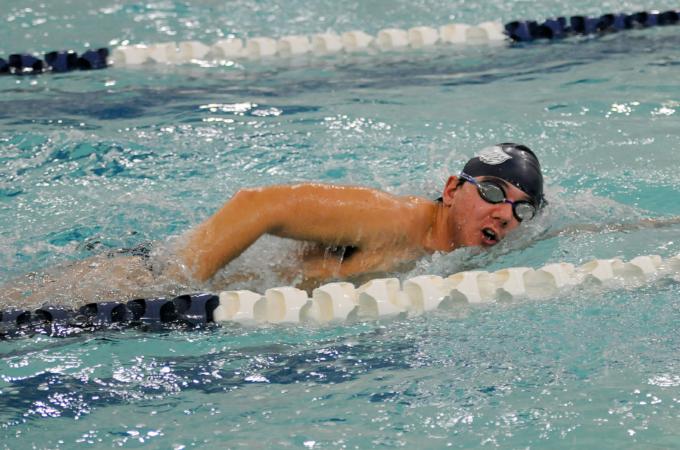Forming the Future: St. John's Prep athletes persevere through pandemic year
DANVERS -- Despite all the changes and challenges they faced, not even a pandemic could keep the student athletes of St. John's Preparatory High School from participating in their sports during the 2020-2021 academic year.
From September 2020 through early April 2021, the all-boys school employed a hybrid learning model to limit the number of students on campus. The student body was divided into two cohorts, which alternated coming to campus for two days at a time. This routine shaped the practice schedule for middle school, freshman, and junior varsity athletes, who practiced on the days when they had live instruction. Varsity athletes practiced every day, coming on campus at the end of each day of remote learning.
The Eagles practiced even when they did not know whether they would get to compete. Coaches and captains kept up their team members' spirits even when their own were flagging. Mask wearing and social distancing were followed as closely as possible, and students were tested after vacations, keeping coronavirus numbers low in the school community.
Swimming and diving were considered low-risk sports since they do not require direct contact between participants. The pool remained open for practice throughout the fall.
"The team members really took advantage of getting in the pool and preparing even when they weren't entirely sure there would even be a season," swimming coach Jeff Fiore said.
He said the "first hurdle" was figuring out how to reduce the number of people present while still giving everyone the same amount of time in the pool. Usually, the middle school, junior varsity, and varsity level swimmers would practice together. This year, practices were split between the three levels.
Instead of holding meets, swimming and diving teams competed virtually and asynchronously within 48 hours of each other. Meet officials supervised each team in their home pool and then cross-referenced times to determine placing and standings.
They had to approach competitions differently, Fiore said, because there was no physical distinction between a practice and a meet. With no visible opponent, their motivation had to come from within.
"It was hard, and I think they were a little put off at first, but I was really impressed with the team by our last meet," which felt "just as exciting as any other state championship meet I've been to," Fiore said.
The Eagles broke two school records and won the Catholic Conference Meet title, marking the school's 17th straight conference title and their 19th overall.
Senior Luke Magnuson said Coach Fiore "deserves high praise for how he kept the team together."
"He inspired us with his steadfast belief that, while competition mattered, it wasn't necessary for our success and certainly needn't be an excuse for failure. He refused to let the circumstances allow us as swimmers to treat the season as a throwaway, and his efforts paid off," Luke said.
The school's contact sports, including basketball, ice hockey, and football, competed primarily with teams in the Catholic Conference, limiting their interaction to about five potential opponents. Teams practiced in small groups, so that if someone tested positive for the coronavirus -- as happened on the hockey and basketball teams -- only people in their group had to quarantine, as opposed to the whole team.
Scheduling was complicated by the occurrence of shutdowns due to coronavirus-related situations. St. John's Prep athletic director Jameson Pelkey said there were times when the Eagles arrived at another school only to be told that their event was canceled.
At the beginning of the football season, the opening week opponent canceled their game just days before it was scheduled to take place. Pelkey spent the next day calling athletic directors and head coaches across Massachusetts, trying to find a team for the Eagles to play against. When he found one, the teams had only a day to prepare.
Since they already faced a limited season, "We both wanted to get a game and to give the kids an opportunity to be able to get out there," Pelkey said.
In a typical year, football training would begin in August. This year, the Eagles could not start until the end of September -- and even then, they could not use equipment. Their practices focused on skills and drills. Many football players also participated in the school's strength and conditioning sessions.
Nick Barrett, a senior and one of the tri-captains of the football team, strove to lead by example, even as he experienced the same emotions as the underclassmen he was trying to motivate. He knew that if he skipped workout for one day, he might skip it again the next day, and so on until they were back on the field.
"The off-season was a hard time, but you just had to pretend like the season was guaranteed to happen and keep working like any other year," he said.
The football season officially started Feb. 24. The Eagles were the only team in the Catholic Conference that played a full slate, playing their first game on March 13, and their final game on April 23.
Football coach Brian St. Pierre said he applauds the students "for going through it and handling it with class and dignity and sticking it out."
"Despite all the challenges, I was happy that these kids got a chance to actually have a season. I think overall, big picture, it was definitely worth it, and I'm glad we were able to do it," he said.



















